Trimester 2 2019 MM200 Essay: Analyzing Alibaba's Sustainability
VerifiedAdded on 2022/10/19
|10
|2879
|152
Essay
AI Summary
This essay provides a comprehensive analysis of the Alibaba Group's sustainability practices, examining whether the company aligns with the characteristics of a sustaining corporation. The introduction outlines the approach, focusing on the application of Benn, Edwards, and Williams' framework, as well as the United Nations' Sustainable Development Goals. The essay begins with an overview of the company, followed by a discussion of the UN's Sustainable Development Goals and how Alibaba's initiatives contribute. It then explores the phases of sustainability, as defined by Benn, Edwards, and Williams, to assess Alibaba's position. The core of the essay analyzes Alibaba's practices in relation to environmental, social, and governance (ESG) factors. The conclusion summarizes the findings, determining whether Alibaba can be classified as a sustaining corporation based on its commitment to long-term value creation, positive societal and environmental impacts, and adherence to international guidelines. The essay references key readings and provides a detailed evaluation of Alibaba's sustainability efforts.

Running Head: ALIBABA CORPORATION 0
ALIBABA CORPORATION
Student details
ALIBABA CORPORATION
Student details
Paraphrase This Document
Need a fresh take? Get an instant paraphrase of this document with our AI Paraphraser
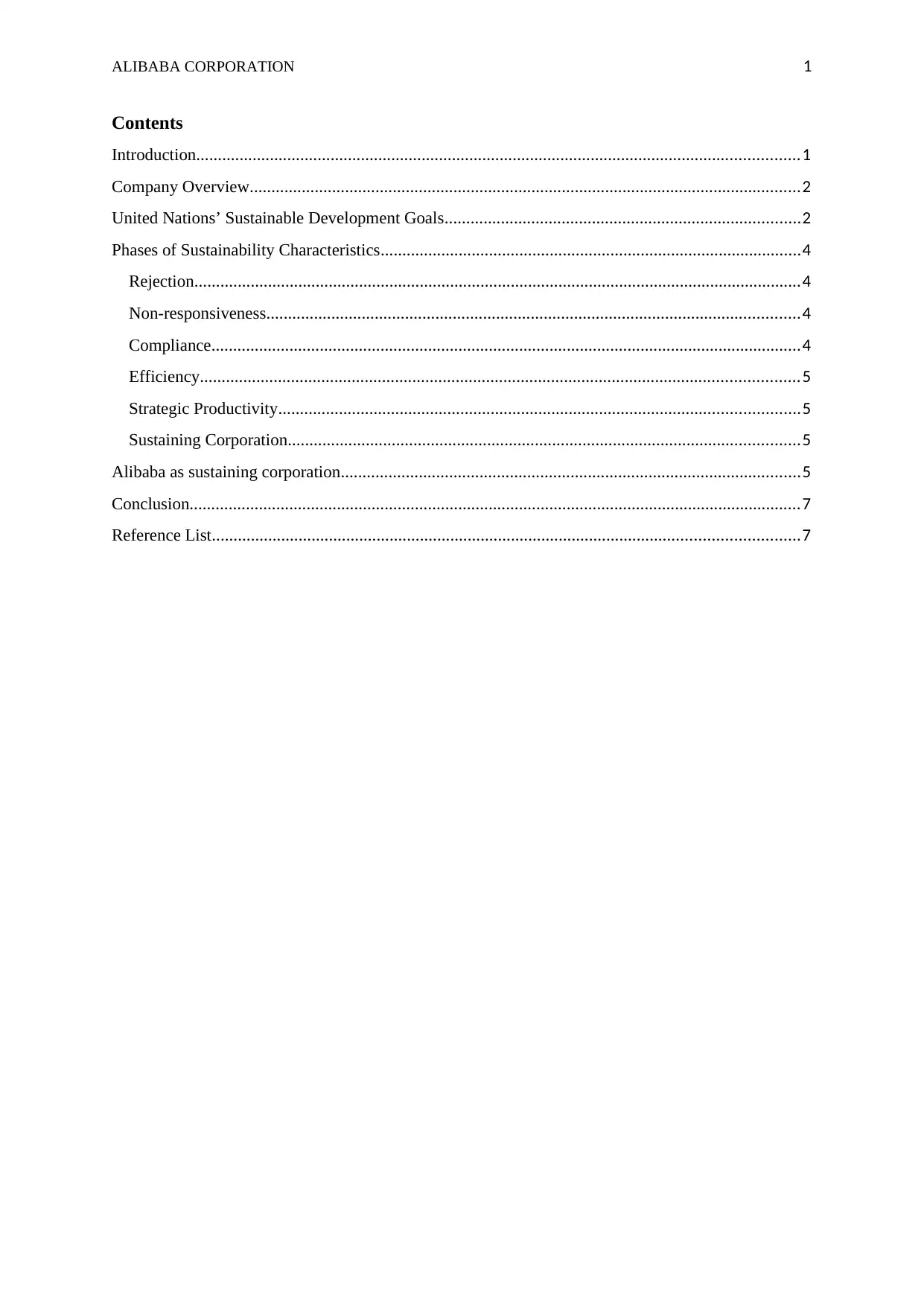
ALIBABA CORPORATION 1
Contents
Introduction...........................................................................................................................................1
Company Overview...............................................................................................................................2
United Nations’ Sustainable Development Goals..................................................................................2
Phases of Sustainability Characteristics.................................................................................................4
Rejection............................................................................................................................................4
Non-responsiveness...........................................................................................................................4
Compliance........................................................................................................................................4
Efficiency..........................................................................................................................................5
Strategic Productivity........................................................................................................................5
Sustaining Corporation......................................................................................................................5
Alibaba as sustaining corporation..........................................................................................................5
Conclusion.............................................................................................................................................7
Reference List.......................................................................................................................................7
Contents
Introduction...........................................................................................................................................1
Company Overview...............................................................................................................................2
United Nations’ Sustainable Development Goals..................................................................................2
Phases of Sustainability Characteristics.................................................................................................4
Rejection............................................................................................................................................4
Non-responsiveness...........................................................................................................................4
Compliance........................................................................................................................................4
Efficiency..........................................................................................................................................5
Strategic Productivity........................................................................................................................5
Sustaining Corporation......................................................................................................................5
Alibaba as sustaining corporation..........................................................................................................5
Conclusion.............................................................................................................................................7
Reference List.......................................................................................................................................7
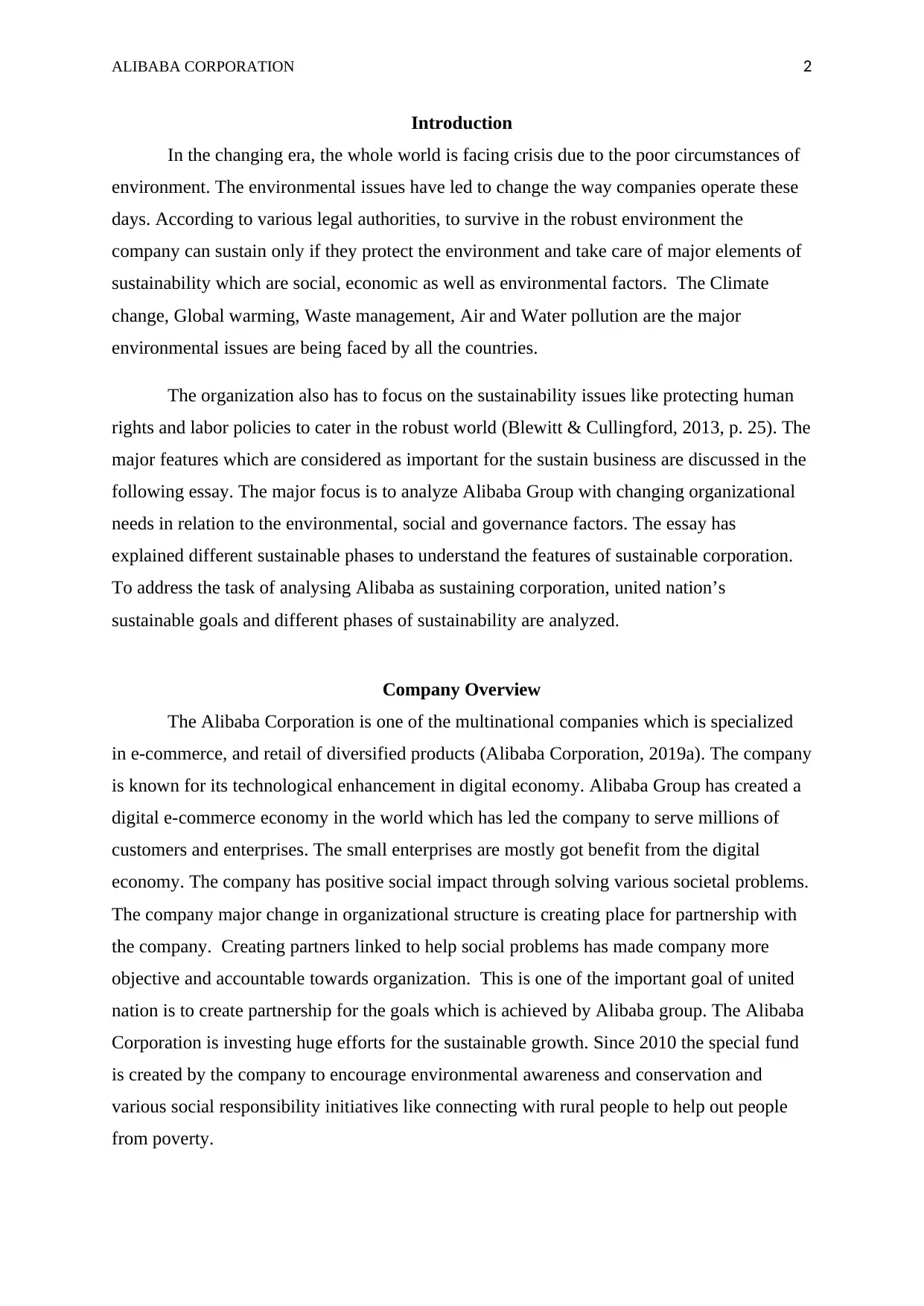
ALIBABA CORPORATION 2
Introduction
In the changing era, the whole world is facing crisis due to the poor circumstances of
environment. The environmental issues have led to change the way companies operate these
days. According to various legal authorities, to survive in the robust environment the
company can sustain only if they protect the environment and take care of major elements of
sustainability which are social, economic as well as environmental factors. The Climate
change, Global warming, Waste management, Air and Water pollution are the major
environmental issues are being faced by all the countries.
The organization also has to focus on the sustainability issues like protecting human
rights and labor policies to cater in the robust world (Blewitt & Cullingford, 2013, p. 25). The
major features which are considered as important for the sustain business are discussed in the
following essay. The major focus is to analyze Alibaba Group with changing organizational
needs in relation to the environmental, social and governance factors. The essay has
explained different sustainable phases to understand the features of sustainable corporation.
To address the task of analysing Alibaba as sustaining corporation, united nation’s
sustainable goals and different phases of sustainability are analyzed.
Company Overview
The Alibaba Corporation is one of the multinational companies which is specialized
in e-commerce, and retail of diversified products (Alibaba Corporation, 2019a). The company
is known for its technological enhancement in digital economy. Alibaba Group has created a
digital e-commerce economy in the world which has led the company to serve millions of
customers and enterprises. The small enterprises are mostly got benefit from the digital
economy. The company has positive social impact through solving various societal problems.
The company major change in organizational structure is creating place for partnership with
the company. Creating partners linked to help social problems has made company more
objective and accountable towards organization. This is one of the important goal of united
nation is to create partnership for the goals which is achieved by Alibaba group. The Alibaba
Corporation is investing huge efforts for the sustainable growth. Since 2010 the special fund
is created by the company to encourage environmental awareness and conservation and
various social responsibility initiatives like connecting with rural people to help out people
from poverty.
Introduction
In the changing era, the whole world is facing crisis due to the poor circumstances of
environment. The environmental issues have led to change the way companies operate these
days. According to various legal authorities, to survive in the robust environment the
company can sustain only if they protect the environment and take care of major elements of
sustainability which are social, economic as well as environmental factors. The Climate
change, Global warming, Waste management, Air and Water pollution are the major
environmental issues are being faced by all the countries.
The organization also has to focus on the sustainability issues like protecting human
rights and labor policies to cater in the robust world (Blewitt & Cullingford, 2013, p. 25). The
major features which are considered as important for the sustain business are discussed in the
following essay. The major focus is to analyze Alibaba Group with changing organizational
needs in relation to the environmental, social and governance factors. The essay has
explained different sustainable phases to understand the features of sustainable corporation.
To address the task of analysing Alibaba as sustaining corporation, united nation’s
sustainable goals and different phases of sustainability are analyzed.
Company Overview
The Alibaba Corporation is one of the multinational companies which is specialized
in e-commerce, and retail of diversified products (Alibaba Corporation, 2019a). The company
is known for its technological enhancement in digital economy. Alibaba Group has created a
digital e-commerce economy in the world which has led the company to serve millions of
customers and enterprises. The small enterprises are mostly got benefit from the digital
economy. The company has positive social impact through solving various societal problems.
The company major change in organizational structure is creating place for partnership with
the company. Creating partners linked to help social problems has made company more
objective and accountable towards organization. This is one of the important goal of united
nation is to create partnership for the goals which is achieved by Alibaba group. The Alibaba
Corporation is investing huge efforts for the sustainable growth. Since 2010 the special fund
is created by the company to encourage environmental awareness and conservation and
various social responsibility initiatives like connecting with rural people to help out people
from poverty.
⊘ This is a preview!⊘
Do you want full access?
Subscribe today to unlock all pages.

Trusted by 1+ million students worldwide
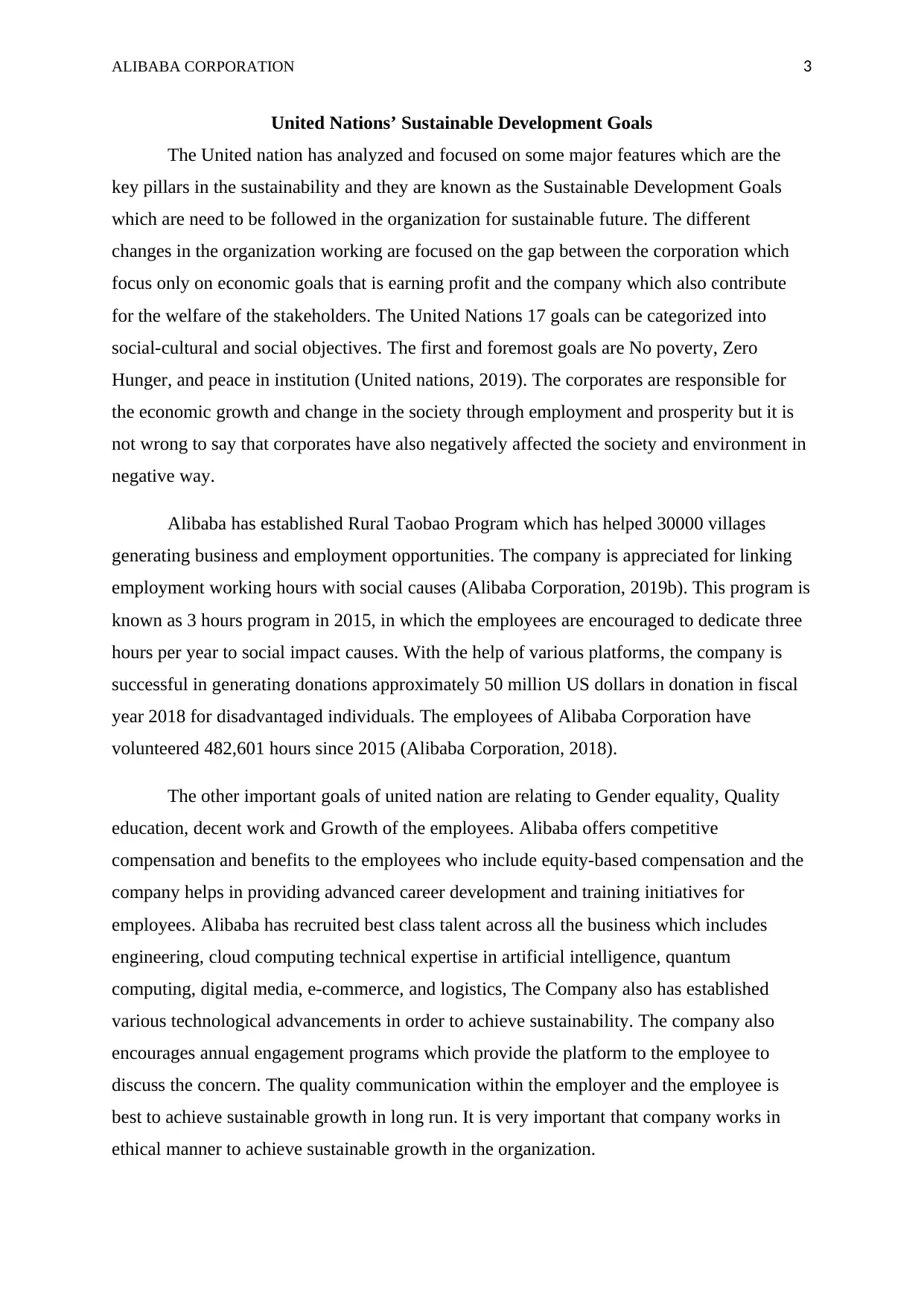
ALIBABA CORPORATION 3
United Nations’ Sustainable Development Goals
The United nation has analyzed and focused on some major features which are the
key pillars in the sustainability and they are known as the Sustainable Development Goals
which are need to be followed in the organization for sustainable future. The different
changes in the organization working are focused on the gap between the corporation which
focus only on economic goals that is earning profit and the company which also contribute
for the welfare of the stakeholders. The United Nations 17 goals can be categorized into
social-cultural and social objectives. The first and foremost goals are No poverty, Zero
Hunger, and peace in institution (United nations, 2019). The corporates are responsible for
the economic growth and change in the society through employment and prosperity but it is
not wrong to say that corporates have also negatively affected the society and environment in
negative way.
Alibaba has established Rural Taobao Program which has helped 30000 villages
generating business and employment opportunities. The company is appreciated for linking
employment working hours with social causes (Alibaba Corporation, 2019b). This program is
known as 3 hours program in 2015, in which the employees are encouraged to dedicate three
hours per year to social impact causes. With the help of various platforms, the company is
successful in generating donations approximately 50 million US dollars in donation in fiscal
year 2018 for disadvantaged individuals. The employees of Alibaba Corporation have
volunteered 482,601 hours since 2015 (Alibaba Corporation, 2018).
The other important goals of united nation are relating to Gender equality, Quality
education, decent work and Growth of the employees. Alibaba offers competitive
compensation and benefits to the employees who include equity-based compensation and the
company helps in providing advanced career development and training initiatives for
employees. Alibaba has recruited best class talent across all the business which includes
engineering, cloud computing technical expertise in artificial intelligence, quantum
computing, digital media, e-commerce, and logistics, The Company also has established
various technological advancements in order to achieve sustainability. The company also
encourages annual engagement programs which provide the platform to the employee to
discuss the concern. The quality communication within the employer and the employee is
best to achieve sustainable growth in long run. It is very important that company works in
ethical manner to achieve sustainable growth in the organization.
United Nations’ Sustainable Development Goals
The United nation has analyzed and focused on some major features which are the
key pillars in the sustainability and they are known as the Sustainable Development Goals
which are need to be followed in the organization for sustainable future. The different
changes in the organization working are focused on the gap between the corporation which
focus only on economic goals that is earning profit and the company which also contribute
for the welfare of the stakeholders. The United Nations 17 goals can be categorized into
social-cultural and social objectives. The first and foremost goals are No poverty, Zero
Hunger, and peace in institution (United nations, 2019). The corporates are responsible for
the economic growth and change in the society through employment and prosperity but it is
not wrong to say that corporates have also negatively affected the society and environment in
negative way.
Alibaba has established Rural Taobao Program which has helped 30000 villages
generating business and employment opportunities. The company is appreciated for linking
employment working hours with social causes (Alibaba Corporation, 2019b). This program is
known as 3 hours program in 2015, in which the employees are encouraged to dedicate three
hours per year to social impact causes. With the help of various platforms, the company is
successful in generating donations approximately 50 million US dollars in donation in fiscal
year 2018 for disadvantaged individuals. The employees of Alibaba Corporation have
volunteered 482,601 hours since 2015 (Alibaba Corporation, 2018).
The other important goals of united nation are relating to Gender equality, Quality
education, decent work and Growth of the employees. Alibaba offers competitive
compensation and benefits to the employees who include equity-based compensation and the
company helps in providing advanced career development and training initiatives for
employees. Alibaba has recruited best class talent across all the business which includes
engineering, cloud computing technical expertise in artificial intelligence, quantum
computing, digital media, e-commerce, and logistics, The Company also has established
various technological advancements in order to achieve sustainability. The company also
encourages annual engagement programs which provide the platform to the employee to
discuss the concern. The quality communication within the employer and the employee is
best to achieve sustainable growth in long run. It is very important that company works in
ethical manner to achieve sustainable growth in the organization.
Paraphrase This Document
Need a fresh take? Get an instant paraphrase of this document with our AI Paraphraser
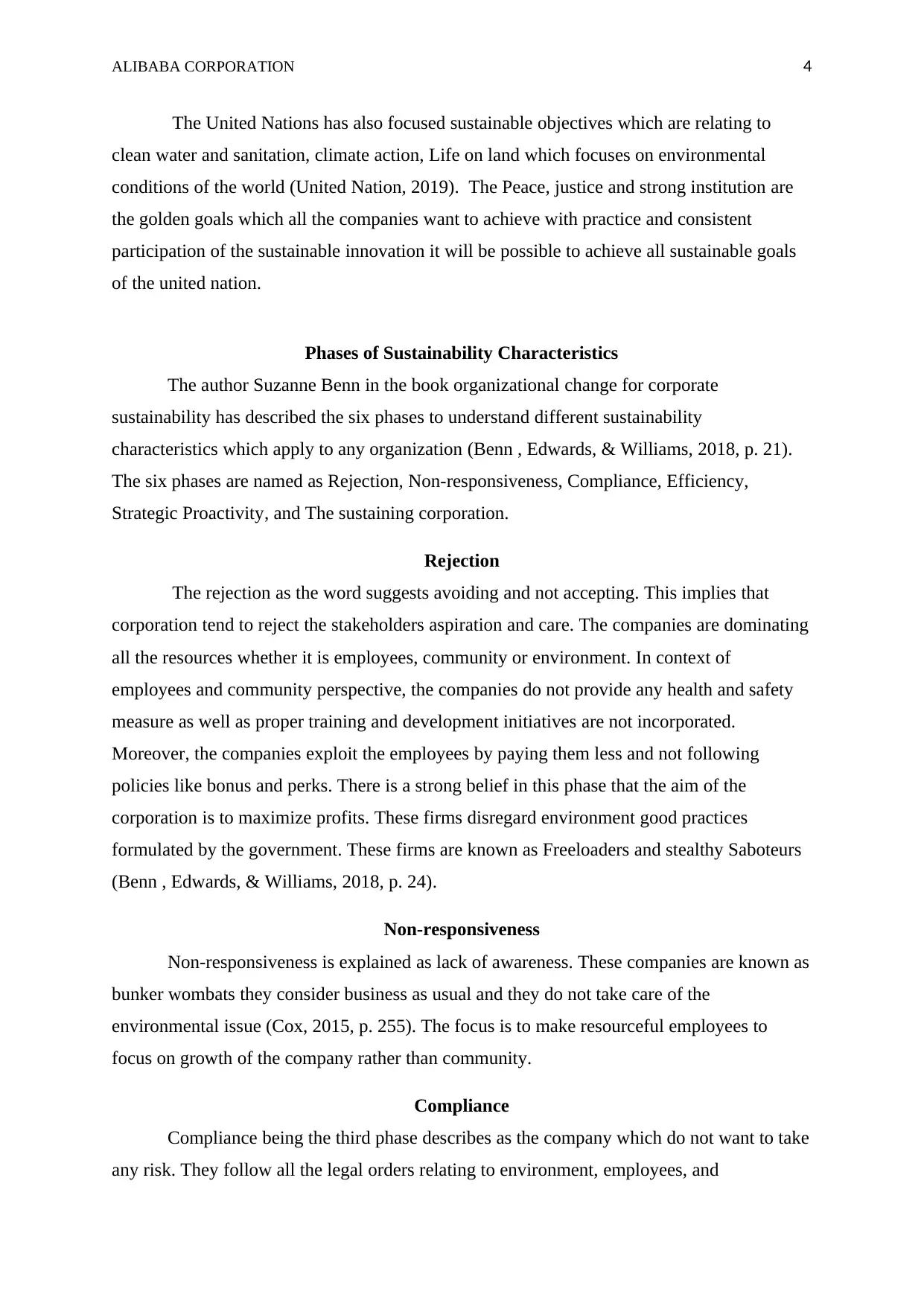
ALIBABA CORPORATION 4
The United Nations has also focused sustainable objectives which are relating to
clean water and sanitation, climate action, Life on land which focuses on environmental
conditions of the world (United Nation, 2019). The Peace, justice and strong institution are
the golden goals which all the companies want to achieve with practice and consistent
participation of the sustainable innovation it will be possible to achieve all sustainable goals
of the united nation.
Phases of Sustainability Characteristics
The author Suzanne Benn in the book organizational change for corporate
sustainability has described the six phases to understand different sustainability
characteristics which apply to any organization (Benn , Edwards, & Williams, 2018, p. 21).
The six phases are named as Rejection, Non-responsiveness, Compliance, Efficiency,
Strategic Proactivity, and The sustaining corporation.
Rejection
The rejection as the word suggests avoiding and not accepting. This implies that
corporation tend to reject the stakeholders aspiration and care. The companies are dominating
all the resources whether it is employees, community or environment. In context of
employees and community perspective, the companies do not provide any health and safety
measure as well as proper training and development initiatives are not incorporated.
Moreover, the companies exploit the employees by paying them less and not following
policies like bonus and perks. There is a strong belief in this phase that the aim of the
corporation is to maximize profits. These firms disregard environment good practices
formulated by the government. These firms are known as Freeloaders and stealthy Saboteurs
(Benn , Edwards, & Williams, 2018, p. 24).
Non-responsiveness
Non-responsiveness is explained as lack of awareness. These companies are known as
bunker wombats they consider business as usual and they do not take care of the
environmental issue (Cox, 2015, p. 255). The focus is to make resourceful employees to
focus on growth of the company rather than community.
Compliance
Compliance being the third phase describes as the company which do not want to take
any risk. They follow all the legal orders relating to environment, employees, and
The United Nations has also focused sustainable objectives which are relating to
clean water and sanitation, climate action, Life on land which focuses on environmental
conditions of the world (United Nation, 2019). The Peace, justice and strong institution are
the golden goals which all the companies want to achieve with practice and consistent
participation of the sustainable innovation it will be possible to achieve all sustainable goals
of the united nation.
Phases of Sustainability Characteristics
The author Suzanne Benn in the book organizational change for corporate
sustainability has described the six phases to understand different sustainability
characteristics which apply to any organization (Benn , Edwards, & Williams, 2018, p. 21).
The six phases are named as Rejection, Non-responsiveness, Compliance, Efficiency,
Strategic Proactivity, and The sustaining corporation.
Rejection
The rejection as the word suggests avoiding and not accepting. This implies that
corporation tend to reject the stakeholders aspiration and care. The companies are dominating
all the resources whether it is employees, community or environment. In context of
employees and community perspective, the companies do not provide any health and safety
measure as well as proper training and development initiatives are not incorporated.
Moreover, the companies exploit the employees by paying them less and not following
policies like bonus and perks. There is a strong belief in this phase that the aim of the
corporation is to maximize profits. These firms disregard environment good practices
formulated by the government. These firms are known as Freeloaders and stealthy Saboteurs
(Benn , Edwards, & Williams, 2018, p. 24).
Non-responsiveness
Non-responsiveness is explained as lack of awareness. These companies are known as
bunker wombats they consider business as usual and they do not take care of the
environmental issue (Cox, 2015, p. 255). The focus is to make resourceful employees to
focus on growth of the company rather than community.
Compliance
Compliance being the third phase describes as the company which do not want to take
any risk. They follow all the legal orders relating to environment, employees, and
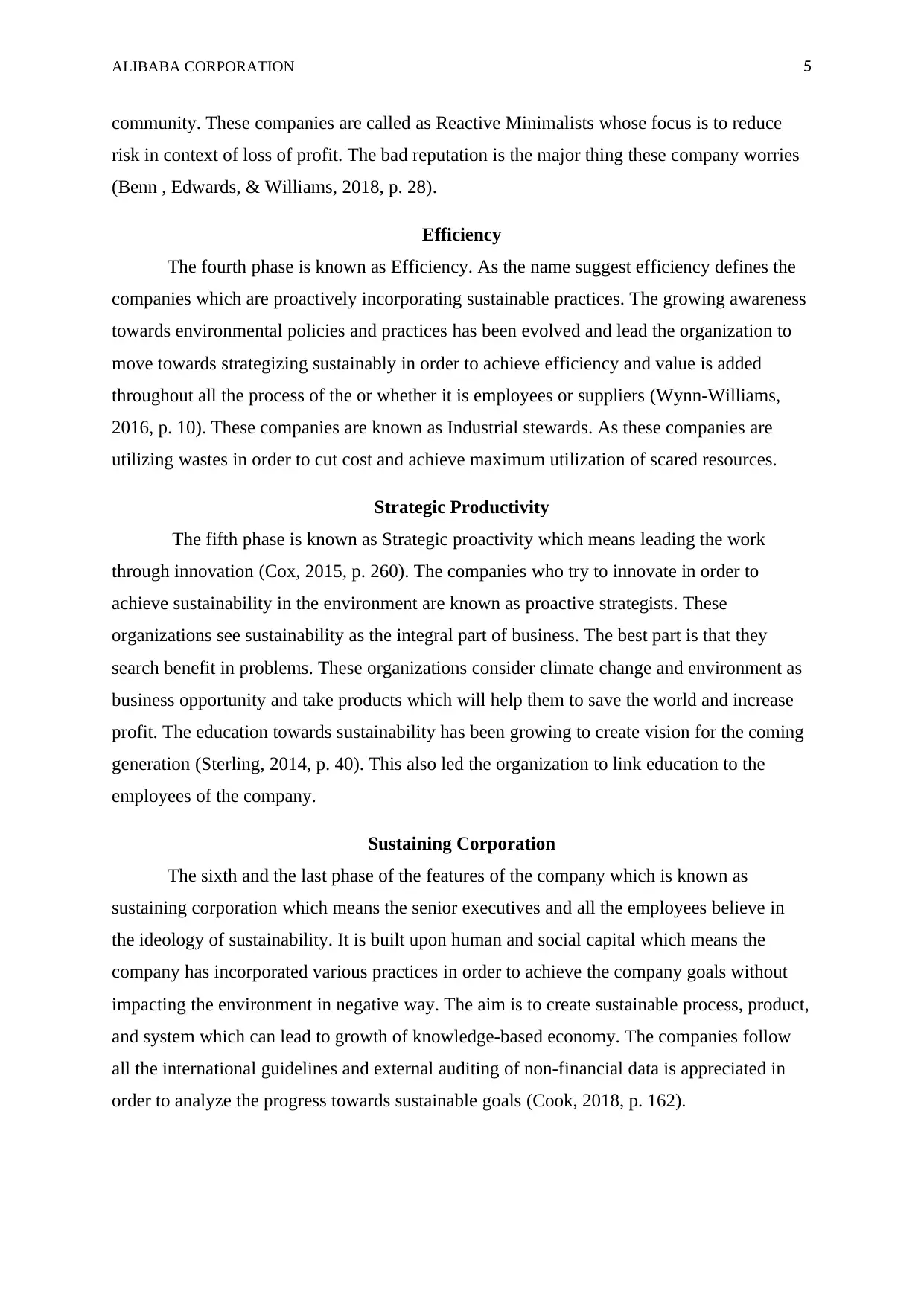
ALIBABA CORPORATION 5
community. These companies are called as Reactive Minimalists whose focus is to reduce
risk in context of loss of profit. The bad reputation is the major thing these company worries
(Benn , Edwards, & Williams, 2018, p. 28).
Efficiency
The fourth phase is known as Efficiency. As the name suggest efficiency defines the
companies which are proactively incorporating sustainable practices. The growing awareness
towards environmental policies and practices has been evolved and lead the organization to
move towards strategizing sustainably in order to achieve efficiency and value is added
throughout all the process of the or whether it is employees or suppliers (Wynn-Williams,
2016, p. 10). These companies are known as Industrial stewards. As these companies are
utilizing wastes in order to cut cost and achieve maximum utilization of scared resources.
Strategic Productivity
The fifth phase is known as Strategic proactivity which means leading the work
through innovation (Cox, 2015, p. 260). The companies who try to innovate in order to
achieve sustainability in the environment are known as proactive strategists. These
organizations see sustainability as the integral part of business. The best part is that they
search benefit in problems. These organizations consider climate change and environment as
business opportunity and take products which will help them to save the world and increase
profit. The education towards sustainability has been growing to create vision for the coming
generation (Sterling, 2014, p. 40). This also led the organization to link education to the
employees of the company.
Sustaining Corporation
The sixth and the last phase of the features of the company which is known as
sustaining corporation which means the senior executives and all the employees believe in
the ideology of sustainability. It is built upon human and social capital which means the
company has incorporated various practices in order to achieve the company goals without
impacting the environment in negative way. The aim is to create sustainable process, product,
and system which can lead to growth of knowledge-based economy. The companies follow
all the international guidelines and external auditing of non-financial data is appreciated in
order to analyze the progress towards sustainable goals (Cook, 2018, p. 162).
community. These companies are called as Reactive Minimalists whose focus is to reduce
risk in context of loss of profit. The bad reputation is the major thing these company worries
(Benn , Edwards, & Williams, 2018, p. 28).
Efficiency
The fourth phase is known as Efficiency. As the name suggest efficiency defines the
companies which are proactively incorporating sustainable practices. The growing awareness
towards environmental policies and practices has been evolved and lead the organization to
move towards strategizing sustainably in order to achieve efficiency and value is added
throughout all the process of the or whether it is employees or suppliers (Wynn-Williams,
2016, p. 10). These companies are known as Industrial stewards. As these companies are
utilizing wastes in order to cut cost and achieve maximum utilization of scared resources.
Strategic Productivity
The fifth phase is known as Strategic proactivity which means leading the work
through innovation (Cox, 2015, p. 260). The companies who try to innovate in order to
achieve sustainability in the environment are known as proactive strategists. These
organizations see sustainability as the integral part of business. The best part is that they
search benefit in problems. These organizations consider climate change and environment as
business opportunity and take products which will help them to save the world and increase
profit. The education towards sustainability has been growing to create vision for the coming
generation (Sterling, 2014, p. 40). This also led the organization to link education to the
employees of the company.
Sustaining Corporation
The sixth and the last phase of the features of the company which is known as
sustaining corporation which means the senior executives and all the employees believe in
the ideology of sustainability. It is built upon human and social capital which means the
company has incorporated various practices in order to achieve the company goals without
impacting the environment in negative way. The aim is to create sustainable process, product,
and system which can lead to growth of knowledge-based economy. The companies follow
all the international guidelines and external auditing of non-financial data is appreciated in
order to analyze the progress towards sustainable goals (Cook, 2018, p. 162).
⊘ This is a preview!⊘
Do you want full access?
Subscribe today to unlock all pages.

Trusted by 1+ million students worldwide
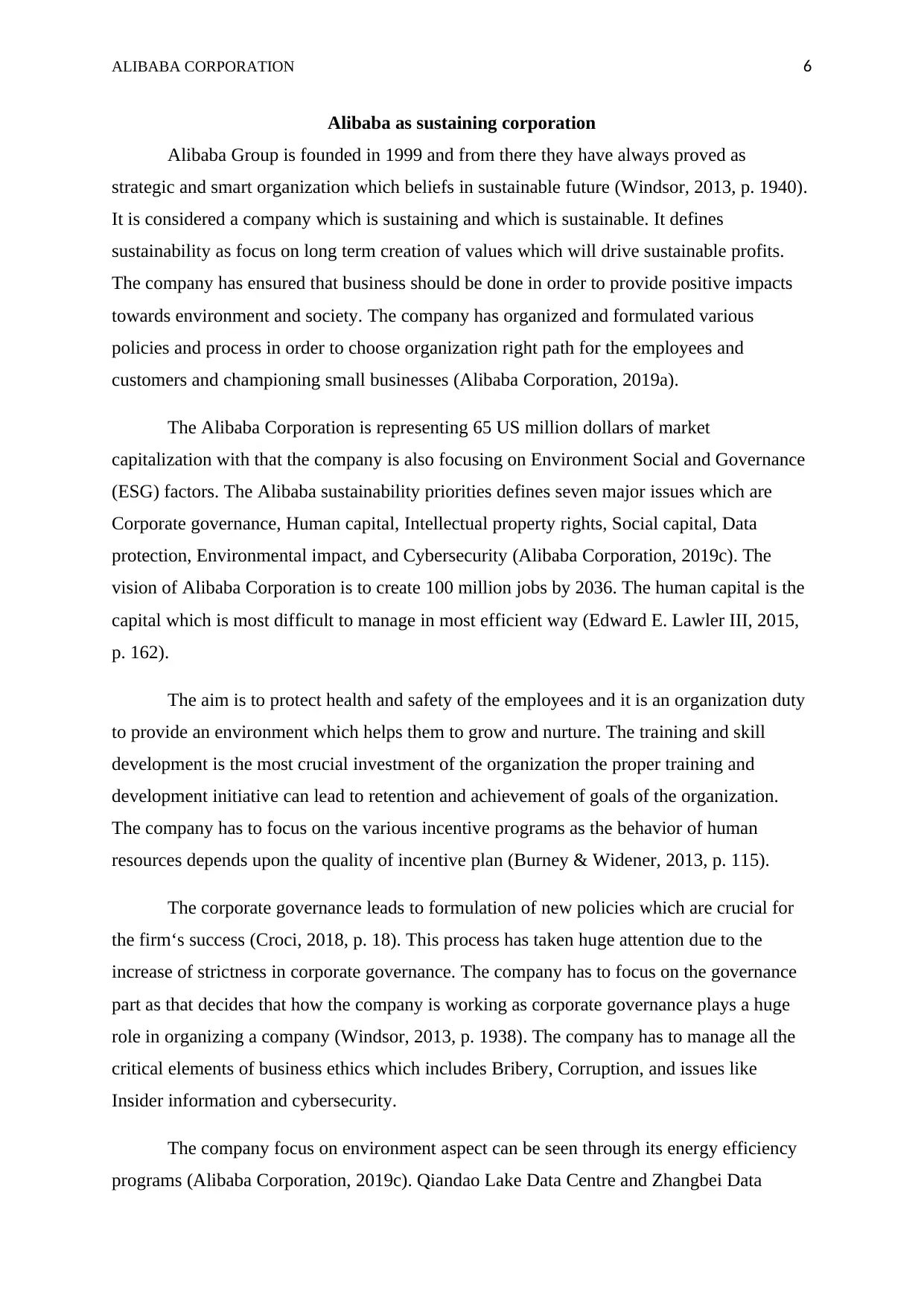
ALIBABA CORPORATION 6
Alibaba as sustaining corporation
Alibaba Group is founded in 1999 and from there they have always proved as
strategic and smart organization which beliefs in sustainable future (Windsor, 2013, p. 1940).
It is considered a company which is sustaining and which is sustainable. It defines
sustainability as focus on long term creation of values which will drive sustainable profits.
The company has ensured that business should be done in order to provide positive impacts
towards environment and society. The company has organized and formulated various
policies and process in order to choose organization right path for the employees and
customers and championing small businesses (Alibaba Corporation, 2019a).
The Alibaba Corporation is representing 65 US million dollars of market
capitalization with that the company is also focusing on Environment Social and Governance
(ESG) factors. The Alibaba sustainability priorities defines seven major issues which are
Corporate governance, Human capital, Intellectual property rights, Social capital, Data
protection, Environmental impact, and Cybersecurity (Alibaba Corporation, 2019c). The
vision of Alibaba Corporation is to create 100 million jobs by 2036. The human capital is the
capital which is most difficult to manage in most efficient way (Edward E. Lawler III, 2015,
p. 162).
The aim is to protect health and safety of the employees and it is an organization duty
to provide an environment which helps them to grow and nurture. The training and skill
development is the most crucial investment of the organization the proper training and
development initiative can lead to retention and achievement of goals of the organization.
The company has to focus on the various incentive programs as the behavior of human
resources depends upon the quality of incentive plan (Burney & Widener, 2013, p. 115).
The corporate governance leads to formulation of new policies which are crucial for
the firm‘s success (Croci, 2018, p. 18). This process has taken huge attention due to the
increase of strictness in corporate governance. The company has to focus on the governance
part as that decides that how the company is working as corporate governance plays a huge
role in organizing a company (Windsor, 2013, p. 1938). The company has to manage all the
critical elements of business ethics which includes Bribery, Corruption, and issues like
Insider information and cybersecurity.
The company focus on environment aspect can be seen through its energy efficiency
programs (Alibaba Corporation, 2019c). Qiandao Lake Data Centre and Zhangbei Data
Alibaba as sustaining corporation
Alibaba Group is founded in 1999 and from there they have always proved as
strategic and smart organization which beliefs in sustainable future (Windsor, 2013, p. 1940).
It is considered a company which is sustaining and which is sustainable. It defines
sustainability as focus on long term creation of values which will drive sustainable profits.
The company has ensured that business should be done in order to provide positive impacts
towards environment and society. The company has organized and formulated various
policies and process in order to choose organization right path for the employees and
customers and championing small businesses (Alibaba Corporation, 2019a).
The Alibaba Corporation is representing 65 US million dollars of market
capitalization with that the company is also focusing on Environment Social and Governance
(ESG) factors. The Alibaba sustainability priorities defines seven major issues which are
Corporate governance, Human capital, Intellectual property rights, Social capital, Data
protection, Environmental impact, and Cybersecurity (Alibaba Corporation, 2019c). The
vision of Alibaba Corporation is to create 100 million jobs by 2036. The human capital is the
capital which is most difficult to manage in most efficient way (Edward E. Lawler III, 2015,
p. 162).
The aim is to protect health and safety of the employees and it is an organization duty
to provide an environment which helps them to grow and nurture. The training and skill
development is the most crucial investment of the organization the proper training and
development initiative can lead to retention and achievement of goals of the organization.
The company has to focus on the various incentive programs as the behavior of human
resources depends upon the quality of incentive plan (Burney & Widener, 2013, p. 115).
The corporate governance leads to formulation of new policies which are crucial for
the firm‘s success (Croci, 2018, p. 18). This process has taken huge attention due to the
increase of strictness in corporate governance. The company has to focus on the governance
part as that decides that how the company is working as corporate governance plays a huge
role in organizing a company (Windsor, 2013, p. 1938). The company has to manage all the
critical elements of business ethics which includes Bribery, Corruption, and issues like
Insider information and cybersecurity.
The company focus on environment aspect can be seen through its energy efficiency
programs (Alibaba Corporation, 2019c). Qiandao Lake Data Centre and Zhangbei Data
Paraphrase This Document
Need a fresh take? Get an instant paraphrase of this document with our AI Paraphraser
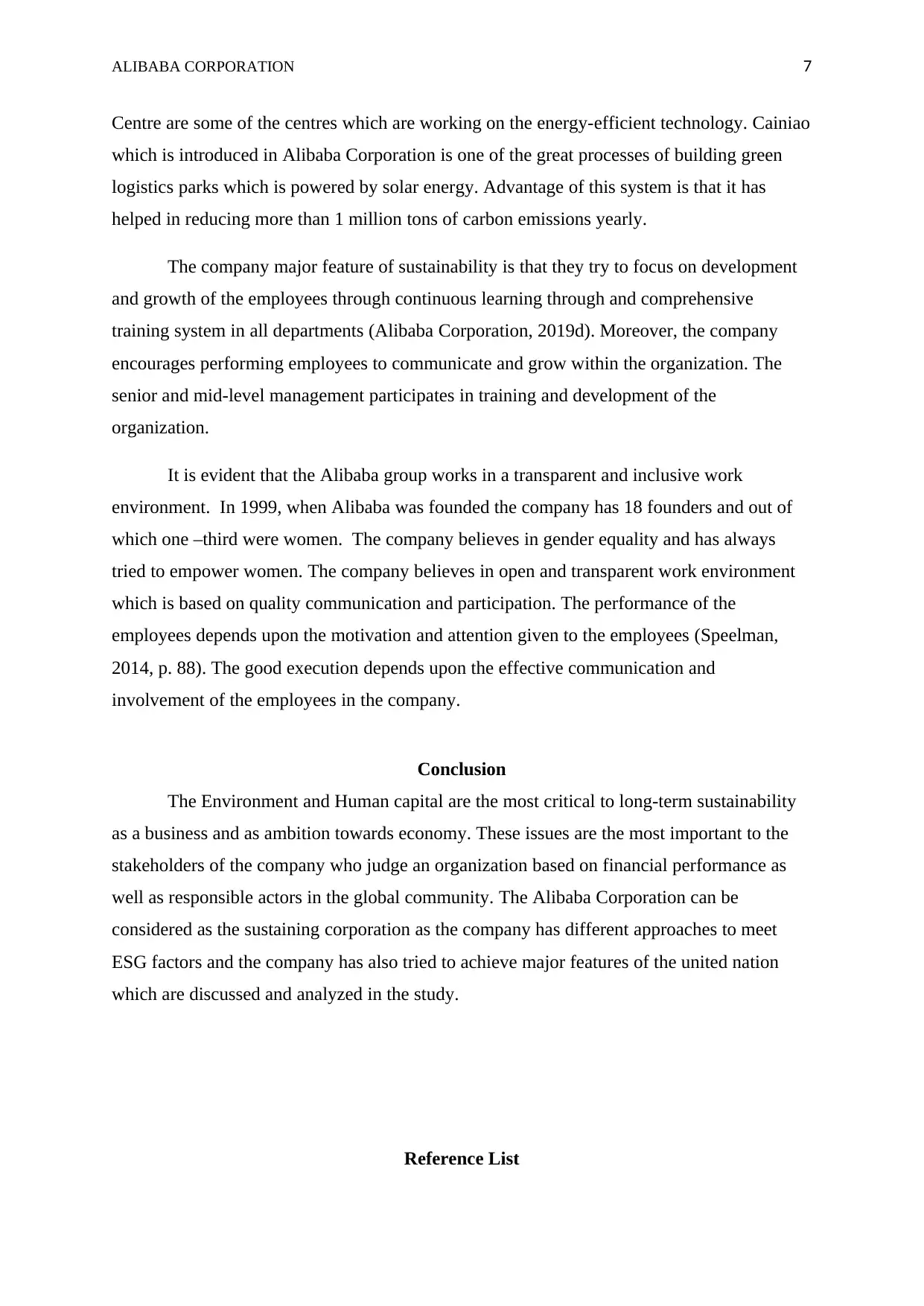
ALIBABA CORPORATION 7
Centre are some of the centres which are working on the energy-efficient technology. Cainiao
which is introduced in Alibaba Corporation is one of the great processes of building green
logistics parks which is powered by solar energy. Advantage of this system is that it has
helped in reducing more than 1 million tons of carbon emissions yearly.
The company major feature of sustainability is that they try to focus on development
and growth of the employees through continuous learning through and comprehensive
training system in all departments (Alibaba Corporation, 2019d). Moreover, the company
encourages performing employees to communicate and grow within the organization. The
senior and mid-level management participates in training and development of the
organization.
It is evident that the Alibaba group works in a transparent and inclusive work
environment. In 1999, when Alibaba was founded the company has 18 founders and out of
which one –third were women. The company believes in gender equality and has always
tried to empower women. The company believes in open and transparent work environment
which is based on quality communication and participation. The performance of the
employees depends upon the motivation and attention given to the employees (Speelman,
2014, p. 88). The good execution depends upon the effective communication and
involvement of the employees in the company.
Conclusion
The Environment and Human capital are the most critical to long-term sustainability
as a business and as ambition towards economy. These issues are the most important to the
stakeholders of the company who judge an organization based on financial performance as
well as responsible actors in the global community. The Alibaba Corporation can be
considered as the sustaining corporation as the company has different approaches to meet
ESG factors and the company has also tried to achieve major features of the united nation
which are discussed and analyzed in the study.
Reference List
Centre are some of the centres which are working on the energy-efficient technology. Cainiao
which is introduced in Alibaba Corporation is one of the great processes of building green
logistics parks which is powered by solar energy. Advantage of this system is that it has
helped in reducing more than 1 million tons of carbon emissions yearly.
The company major feature of sustainability is that they try to focus on development
and growth of the employees through continuous learning through and comprehensive
training system in all departments (Alibaba Corporation, 2019d). Moreover, the company
encourages performing employees to communicate and grow within the organization. The
senior and mid-level management participates in training and development of the
organization.
It is evident that the Alibaba group works in a transparent and inclusive work
environment. In 1999, when Alibaba was founded the company has 18 founders and out of
which one –third were women. The company believes in gender equality and has always
tried to empower women. The company believes in open and transparent work environment
which is based on quality communication and participation. The performance of the
employees depends upon the motivation and attention given to the employees (Speelman,
2014, p. 88). The good execution depends upon the effective communication and
involvement of the employees in the company.
Conclusion
The Environment and Human capital are the most critical to long-term sustainability
as a business and as ambition towards economy. These issues are the most important to the
stakeholders of the company who judge an organization based on financial performance as
well as responsible actors in the global community. The Alibaba Corporation can be
considered as the sustaining corporation as the company has different approaches to meet
ESG factors and the company has also tried to achieve major features of the united nation
which are discussed and analyzed in the study.
Reference List
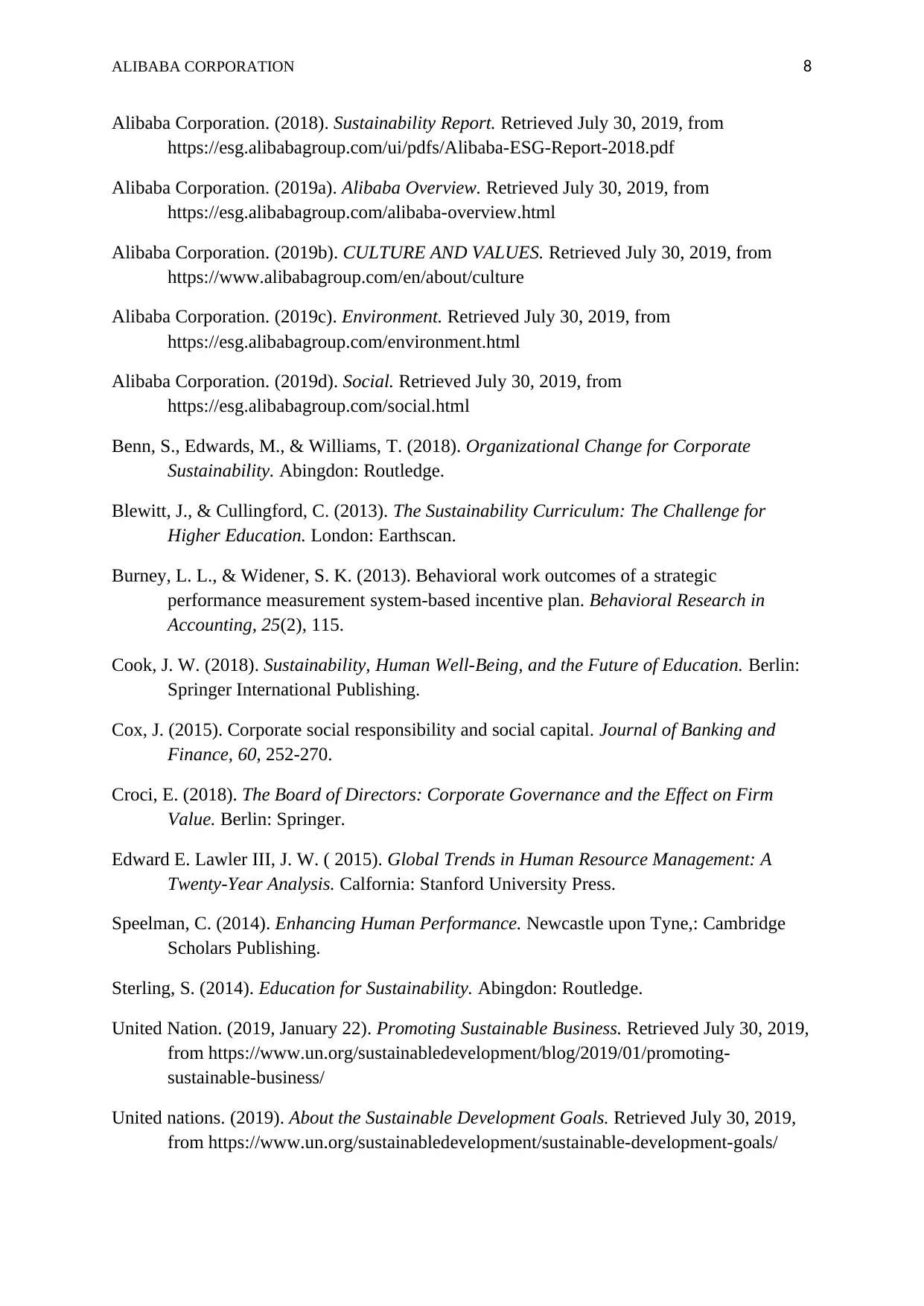
ALIBABA CORPORATION 8
Alibaba Corporation. (2018). Sustainability Report. Retrieved July 30, 2019, from
https://esg.alibabagroup.com/ui/pdfs/Alibaba-ESG-Report-2018.pdf
Alibaba Corporation. (2019a). Alibaba Overview. Retrieved July 30, 2019, from
https://esg.alibabagroup.com/alibaba-overview.html
Alibaba Corporation. (2019b). CULTURE AND VALUES. Retrieved July 30, 2019, from
https://www.alibabagroup.com/en/about/culture
Alibaba Corporation. (2019c). Environment. Retrieved July 30, 2019, from
https://esg.alibabagroup.com/environment.html
Alibaba Corporation. (2019d). Social. Retrieved July 30, 2019, from
https://esg.alibabagroup.com/social.html
Benn, S., Edwards, M., & Williams, T. (2018). Organizational Change for Corporate
Sustainability. Abingdon: Routledge.
Blewitt, J., & Cullingford, C. (2013). The Sustainability Curriculum: The Challenge for
Higher Education. London: Earthscan.
Burney, L. L., & Widener, S. K. (2013). Behavioral work outcomes of a strategic
performance measurement system-based incentive plan. Behavioral Research in
Accounting, 25(2), 115.
Cook, J. W. (2018). Sustainability, Human Well-Being, and the Future of Education. Berlin:
Springer International Publishing.
Cox, J. (2015). Corporate social responsibility and social capital. Journal of Banking and
Finance, 60, 252-270.
Croci, E. (2018). The Board of Directors: Corporate Governance and the Effect on Firm
Value. Berlin: Springer.
Edward E. Lawler III, J. W. ( 2015). Global Trends in Human Resource Management: A
Twenty-Year Analysis. Calfornia: Stanford University Press.
Speelman, C. (2014). Enhancing Human Performance. Newcastle upon Tyne,: Cambridge
Scholars Publishing.
Sterling, S. (2014). Education for Sustainability. Abingdon: Routledge.
United Nation. (2019, January 22). Promoting Sustainable Business. Retrieved July 30, 2019,
from https://www.un.org/sustainabledevelopment/blog/2019/01/promoting-
sustainable-business/
United nations. (2019). About the Sustainable Development Goals. Retrieved July 30, 2019,
from https://www.un.org/sustainabledevelopment/sustainable-development-goals/
Alibaba Corporation. (2018). Sustainability Report. Retrieved July 30, 2019, from
https://esg.alibabagroup.com/ui/pdfs/Alibaba-ESG-Report-2018.pdf
Alibaba Corporation. (2019a). Alibaba Overview. Retrieved July 30, 2019, from
https://esg.alibabagroup.com/alibaba-overview.html
Alibaba Corporation. (2019b). CULTURE AND VALUES. Retrieved July 30, 2019, from
https://www.alibabagroup.com/en/about/culture
Alibaba Corporation. (2019c). Environment. Retrieved July 30, 2019, from
https://esg.alibabagroup.com/environment.html
Alibaba Corporation. (2019d). Social. Retrieved July 30, 2019, from
https://esg.alibabagroup.com/social.html
Benn, S., Edwards, M., & Williams, T. (2018). Organizational Change for Corporate
Sustainability. Abingdon: Routledge.
Blewitt, J., & Cullingford, C. (2013). The Sustainability Curriculum: The Challenge for
Higher Education. London: Earthscan.
Burney, L. L., & Widener, S. K. (2013). Behavioral work outcomes of a strategic
performance measurement system-based incentive plan. Behavioral Research in
Accounting, 25(2), 115.
Cook, J. W. (2018). Sustainability, Human Well-Being, and the Future of Education. Berlin:
Springer International Publishing.
Cox, J. (2015). Corporate social responsibility and social capital. Journal of Banking and
Finance, 60, 252-270.
Croci, E. (2018). The Board of Directors: Corporate Governance and the Effect on Firm
Value. Berlin: Springer.
Edward E. Lawler III, J. W. ( 2015). Global Trends in Human Resource Management: A
Twenty-Year Analysis. Calfornia: Stanford University Press.
Speelman, C. (2014). Enhancing Human Performance. Newcastle upon Tyne,: Cambridge
Scholars Publishing.
Sterling, S. (2014). Education for Sustainability. Abingdon: Routledge.
United Nation. (2019, January 22). Promoting Sustainable Business. Retrieved July 30, 2019,
from https://www.un.org/sustainabledevelopment/blog/2019/01/promoting-
sustainable-business/
United nations. (2019). About the Sustainable Development Goals. Retrieved July 30, 2019,
from https://www.un.org/sustainabledevelopment/sustainable-development-goals/
⊘ This is a preview!⊘
Do you want full access?
Subscribe today to unlock all pages.

Trusted by 1+ million students worldwide

ALIBABA CORPORATION 9
Windsor, D. (2013). Corporate social responsibility and irresponsibility: A positive theory
approach. Journal of Business Research, 10, 1937-1944.
Wynn-Williams, M. (2016). Managing Global Business. New York : Macmillan Publishers
limited.
Windsor, D. (2013). Corporate social responsibility and irresponsibility: A positive theory
approach. Journal of Business Research, 10, 1937-1944.
Wynn-Williams, M. (2016). Managing Global Business. New York : Macmillan Publishers
limited.
1 out of 10
Related Documents
Your All-in-One AI-Powered Toolkit for Academic Success.
+13062052269
info@desklib.com
Available 24*7 on WhatsApp / Email
![[object Object]](/_next/static/media/star-bottom.7253800d.svg)
Unlock your academic potential
Copyright © 2020–2026 A2Z Services. All Rights Reserved. Developed and managed by ZUCOL.

![Alibaba Group Sustainability Analysis Essay: Course [Code/Name]](/_next/image/?url=https%3A%2F%2Fdesklib.com%2Fmedia%2Fimages%2Fmc%2F58520fa985f64d6aa1043ba966a5eb03.jpg&w=256&q=75)



